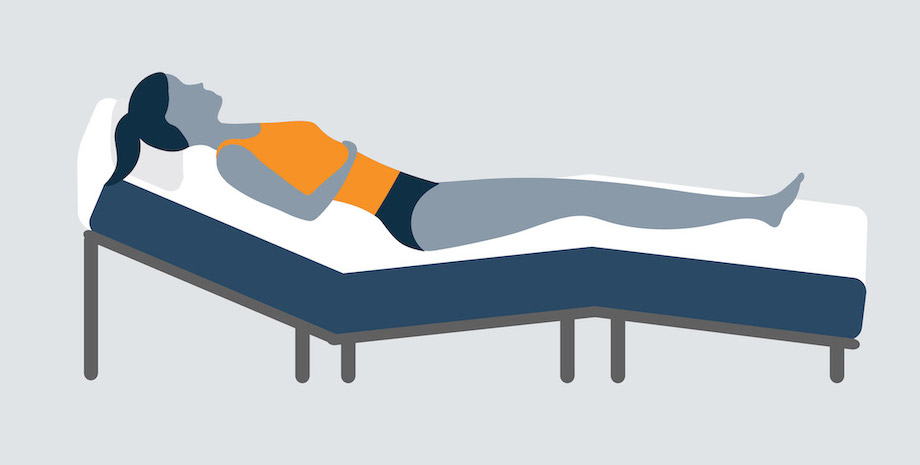Feeling bloated can be uncomfortable, especially when it disrupts your sleep. You toss and turn, hoping for relief, but it seems just out of reach.
What if the secret to a peaceful night lies in how you position your body? Imagine waking up refreshed, free from the bloated discomfort that held you captive all night. We’ll explore the best sleeping positions for a bloated stomach that could transform your nights and improve your mornings.
Discover the simple changes you can make to reclaim your restful sleep. Stay with us, and let’s find your perfect sleep solution together.
Causes Of Bloating
Bloating can be uncomfortable and frustrating, disrupting daily life. It often stems from various causes, making it essential to understand its origins. Knowing what triggers bloating can help manage and reduce its impact. Let’s explore the common causes of bloating.
1. Overeating
Eating too much can stretch the stomach. This leads to a feeling of fullness and bloating. Large meals put pressure on the digestive system, slowing down digestion.
2. Gas Buildup
Gas often accumulates in the digestive tract. This can result from swallowing air or breaking down certain foods. Foods like beans, lentils, and carbonated drinks are common culprits.
3. Food Intolerances
Some foods are hard to digest. Lactose and gluten are examples. When consumed, they can cause discomfort and bloating.
4. Constipation
Constipation slows the movement of food in the gut. This leads to a buildup and bloating. Fiber, water, and exercise can help relieve constipation.
5. Hormonal Changes
Many experience bloating during hormonal shifts. This is common during menstruation. Hormones can affect how the digestive system functions, leading to bloating.
6. Stress and Anxiety
Stress impacts the digestive system. It can cause changes in digestion and lead to bloating. Relaxation techniques may help reduce stress-related bloating.

Credit: www.sleepadvisor.org
Importance Of Sleep Position
Sleep position plays a crucial role in digestive health. The way you sleep affects how your body processes food. Especially when dealing with a bloated stomach. Choosing the right position can ease discomfort and promote better digestion. It helps reduce pressure on your abdomen. This can lead to a more restful night’s sleep. Understanding the importance of sleep position is key to managing bloating effectively.
Benefits Of The Right Sleep Position
The correct sleep position can alleviate symptoms of bloating. It helps prevent gas from building up in your digestive tract. This reduces the sensation of fullness and discomfort. Certain positions can also help food move smoothly through your system. This aids in faster digestion and lessens the chance of overnight bloating.
Impact On Your Digestive System
The way you position your body during sleep affects digestion. Lying on your left side can improve digestion efficiency. It allows gravity to assist the movement of food through your intestines. This position can also minimize acid reflux and heartburn. It ensures your stomach is below your esophagus, preventing acid from rising.
Choosing Comfort Over Habit
Many people sleep in positions that feel familiar. But these might not be the best for a bloated stomach. Trying a new position might seem uncomfortable at first. Yet, it can bring significant relief and improve sleep quality. Prioritizing comfort over habit can make a big difference. Adjusting your sleep posture can help manage bloating better.
Left Side Sleeping
Sleeping on your left side can help ease a bloated stomach. This position supports better digestion and reduces discomfort. It allows gravity to assist food movement through the digestive tract.
Sleeping on your left side can be a simple solution for bloated stomachs. This position helps the body in many ways. It aligns the organs for better function. The stomach and pancreas hang naturally. This can aid digestion and reduce discomfort. Here, we explore how left side sleeping improves digestion and reduces bloating.
Benefits For Digestion
Left side sleeping supports the digestive system. The position lets gravity help move food. It aids the natural flow through the intestines. This may speed up digestion. A faster digestion process can ease bloating. The stomach empties more efficiently. This reduces the chance of discomfort. Sleeping this way might enhance nutrient absorption too.
Reducing Gas And Bloating
Gas and bloating can cause pain and embarrassment. Left side sleeping can ease these problems. The position reduces pressure on the stomach. It helps gas pass more easily. Less pressure means less discomfort. The intestines remain free to move. This can reduce gas build-up. Fewer gas pockets mean less bloating. This position may also prevent acid reflux. A calmer stomach leads to better rest.

Credit: www.reddit.com
Right Side Sleeping
Sleeping on your right side can ease bloating. It helps digestion by aiding the natural movement of food. This position may reduce stomach discomfort and promote better rest.
Are you struggling with bloating and wondering how your sleeping position might help? Many people find relief from bloating by choosing to sleep on their right side. This position is often recommended for digestive comfort, but how effective is it really? Let’s dive into the pros and cons of right side sleeping and its impact on acid reflux.
Pros And Cons
Sleeping on your right side has its advantages. It might help you relieve pressure in your stomach, which can be especially beneficial after a big meal. This position allows your stomach to rest in a way that might ease bloating. However, there are downsides to consider. Right side sleeping might not be the best option for everyone. Some people find it uncomfortable or notice increased discomfort in other parts of their body, like their shoulders or hips. Ask yourself: Have you tried sleeping on your right side before? What was your experience?
Impact On Acid Reflux
Right side sleeping can impact your acid reflux. While it might seem counterintuitive, studies suggest that sleeping on your right side can actually worsen acid reflux symptoms for some individuals. This is because the position can allow stomach acid to flow more easily into the esophagus. Imagine waking up in the middle of the night with a burning sensation. Not ideal, right? If you’re prone to acid reflux, switching to your left side might be a better option. Consider how your sleeping position affects your digestive health. Could a simple change make a difference in your nightly comfort? Adjusting your sleeping position is a practical step you can take tonight. Experiment with what works best for you and your body.
Back Sleeping
Back sleeping can help relieve bloating by allowing the digestive system to function more effectively. This position reduces pressure on the stomach, promoting comfort and better sleep quality.
Back sleeping can ease bloating. It allows your body to relax. This position helps in reducing stomach pressure. Lying on your back promotes better digestion. It can also help in aligning your spine. Many find this position comfortable and soothing.
Alleviating Stomach Pressure
Sleeping on your back can reduce stomach pressure. This position helps your organs settle naturally. It prevents excessive pressure on your stomach. By lying flat, your body can relax. This leads to reduced bloating. Your stomach gets a chance to digest food better. Ensure your head is slightly elevated. This can aid in preventing acid reflux.
Using Pillows For Support
Pillows can enhance comfort while back sleeping. Place a pillow under your knees. This can align your spine properly. It also helps in reducing lower back strain. A pillow under your head can keep it elevated. This supports your neck and reduces discomfort. Ensure your pillow is not too high or too low. Proper pillow support can improve your sleep quality.
Stomach Sleeping
Stomach sleeping might seem like the most straightforward option for a bloated stomach. Lying flat on your tummy can sometimes help you feel less puffed up by slightly compressing your belly area. It’s a position many people naturally assume when seeking comfort, but it does come with its own set of challenges.
Potential Drawbacks
Sleeping on your stomach can put pressure on your spine, leading to back pain. Your neck might also be twisted at an awkward angle, causing strain. This position can exacerbate bloating by restricting the diaphragm’s movement, making deep breathing difficult.
Imagine waking up with a stiff neck or a sore back. It’s not the best start to your day, is it? If you find yourself frequently shifting during the night or waking up with discomfort, it might be time to reconsider this position.
Alternatives To Consider
Have you tried sleeping on your left side? This position can help improve digestion and reduce bloating. It allows gravity to assist in moving food through your intestines, giving you a more restful night.
Another option is to sleep with your head elevated. Use an extra pillow to prop up your head, which can prevent acid reflux and ease bloating. You might be surprised at how a small change can make a big difference.
Experiment with different positions to find what works best for you. Could a pillow between your knees help align your spine? Or perhaps a gentle yoga routine before bed could help relax your muscles?
Your ideal sleeping position is out there. It’s worth exploring different options to find the one that leaves you feeling refreshed and free from bloating discomfort.
Tips For Better Sleep With Bloating
Experiencing bloating can be a real challenge, especially when it comes to getting a good night’s sleep. You toss, turn, and find it tough to get comfortable. But worry not! There are simple and effective tips to improve your sleep even when bloated. Let’s dive into some practical solutions you can try tonight.
Dietary Adjustments
What you eat can directly impact your bloating and sleep quality. Start by reducing foods that cause gas like beans, broccoli, and carbonated drinks. Instead, opt for easy-to-digest foods such as bananas and rice. They can help minimize bloating and discomfort.
Hydration plays a crucial role too. Drink plenty of water throughout the day, but try to limit it in the hour before bed. This prevents waking up frequently to use the bathroom, allowing for a more restful sleep. Have you considered herbal teas? Peppermint or chamomile tea can soothe your digestive system, making you feel lighter and more relaxed.
Bedtime Routines
Your pre-sleep rituals can make a world of difference. Establish a relaxing bedtime routine to signal your body it’s time to wind down. Gentle yoga poses like the “child’s pose” can help relieve gas and ease bloating, preparing you for sleep.
A warm bath before bed can work wonders. The heat relaxes your muscles and aids digestion, soothing your bloated stomach. How about trying a simple breathing exercise? Deep breathing can calm your mind and alleviate tension, giving your belly a break from stress.
Another tip is to elevate your head with an extra pillow. This can prevent stomach acid from rising, reducing bloating and promoting better sleep. Have you tried sleeping on your left side? It can improve digestion and reduce bloating, offering you a more comfortable night.
When To Seek Medical Advice
If bloating persists despite your best efforts, it might be time to consult a healthcare professional. Frequent or severe bloating can be a sign of underlying issues that need medical attention. Don’t hesitate to reach out if you’re experiencing significant discomfort.
Pay attention to any additional symptoms like weight loss or changes in bowel habits. These could indicate more serious conditions needing evaluation. Have you noticed any persistent pain? It’s worth discussing with your doctor to ensure there’s nothing more concerning at play.
Remember, you’re not alone in this. Many people experience bloating and struggle with sleep. Seeking help can provide you with the right tools and treatments to manage your symptoms effectively.
What changes will you make tonight for better sleep? Try these tips and let us know how they work for you!

Credit: www.sleepadvisor.org
Frequently Asked Questions
What Is The Best Sleeping Position For Bloating?
Sleeping on your left side is often recommended for bloating. This position can help digestion and reduce gas. By aligning the stomach and intestines, it may promote better gut health. Elevating your head slightly can also provide relief. Experiment with a pillow under your knees for added comfort.
Does Sleeping On Your Stomach Help Bloating?
Sleeping on your stomach is generally not recommended for bloating. This position can put pressure on your abdomen, worsening discomfort. Instead, try sleeping on your left side to aid digestion. Using a supportive pillow can enhance comfort and reduce bloating.
It’s important to find what works best for you.
How Can I Relieve Bloating While Sleeping?
To relieve bloating while sleeping, elevate your head with a pillow. This can help reduce pressure and aid digestion. Consider sleeping on your left side for better stomach alignment. Avoid heavy meals and carbonated drinks before bed. Staying hydrated and practicing relaxation techniques can also help reduce bloating.
Can Lying On Your Back Reduce Bloating?
Lying on your back with your head elevated can help reduce bloating. This position may aid digestion and decrease pressure on your stomach. Use a supportive pillow to maintain comfort. Experiment with a pillow under your knees to improve spinal alignment.
Each person may respond differently, so adjustments might be needed.
Conclusion
Choosing the right sleeping position eases bloating discomfort. Try sleeping on your left side. This position helps digestion and reduces gas. Lying on your back with a pillow under your knees can also help. It supports your spine and relieves pressure.
Avoid sleeping on your stomach, as it may worsen bloating. Small adjustments make a big difference in comfort. Experiment with these positions to find what suits you best. Prioritize comfort and listen to your body. Restful sleep is important for overall health.
Sleep well and wake up refreshed.
